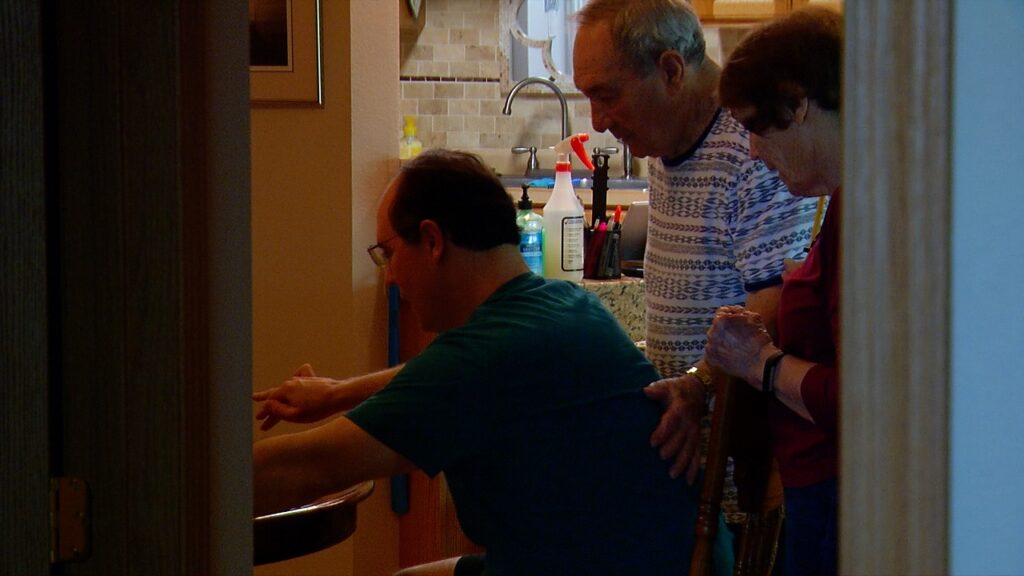From group home to senior living. Staffing crisis in Minnesota’s disability services forces aging parents into desperate situations
[anvplayer video=”5126521″ station=”998122″]
Thirty years ago, Matt and Eunice Morelli’s lives changed forever when their son Marco was severely injured in a car accident.
The healthy, athletic 28-year-old spent a year in a coma and suffered a traumatic brain injury.
Matt and Eunice spent years caring for their son in their own home. A decade ago, they decided it was time to plan for Marco’s future.
“We wanted to make sure he had someplace that he felt comfortable with and at home and was familiar with before we passed away,” Eunice Morelli said.
They thought they found that place when they moved Marco, now 56, into a four-person group home in Afton.
Thirty years ago, Matt and Eunice Morelli’s lives changed forever when their son Marco was severely injured in a car accident. The healthy, athletic 28-year-old spent a year in a coma and suffered a traumatic brain injury.
But that home is now dealing with such severe staffing shortages that Matt and Eunice, who are 90 and 87 respectively, are having to provide demanding physical care several days a week.
Most weeks, from Friday to Monday, Matt and Eunice bring Marco home to live with them in their small, two-bedroom apartment in their senior living facility.
“We sometimes think that’s probably why we’re living so damn long because of him,” she said. “We have to be there. We have to take care of him.”

several days a week because of staffing shortages at his group home for people with disabilities.
Related: As group homes in Minnesota struggle to find workers, families forced to provide complex care for loved ones with disabilities
In the last year, dozens of group homes have closed across the state after struggling to hire and retain workers. The closures have impacted nearly 700 people, according to ARRM, an organization that advocates on behalf of residential providers who care for people with disabilities.
“Beyond frustrating”
“We’re seeing it in numbers that we’ve never seen before,” said Sue Schettle, who serves as CEO of ARRM.
Advocates say the crisis was made worse by the legislature’s failure to negotiate a deal that would have infused millions of dollars into the industry. In May, the regular session ended, and the supplement spending bill never passed.
“We need more money to support the workforce,” Schettle said. “At the end of the day, when nothing is done, it’s beyond frustrating.”
In June, families and providers rallied outside of the governor’s residence in St. Paul, urging Governor Tim Walz to call a special session and prioritize spending on disability services.
“If and when these group homes close, you tell me where these people are going to go,” said parent David Goldstein at the rally.
In a statement to 5 INVESTIGATES, a spokesperson for the governor said he “recognizes the issues facing residents in group homes,” as well as nursing home families across the state.
“The Governor continues to push legislators to come back to the table because he recognizes that Minnesotans need assistance,” the statement read.
“That’s our nightmare”
While the leader of the Minnesota Department of Human Services previously said the situation is “fairly stable,” even group homes that don’t close are operating with the bare minimum staffing levels, often leaving families to step in and provide complex care.
“The group home company is working with four different agencies right now to staff the house,” said Joan Skluzacek, whose son Nicolas lives in the Afton group home with Marco.
Since this spring, Joan and her husband Paul have been the only consistent care providers.
“Pretty much every day one of us is here, at least for a while, trying to help,” Joan said in an interview earlier this summer.
The Morellis said while they are able to help with shifts now, they’re worried about what the future looks after they pass away.
“That’s our nightmare,” Eunice Morelli said. “We think about it all the time. What’s gonna happen to him?”